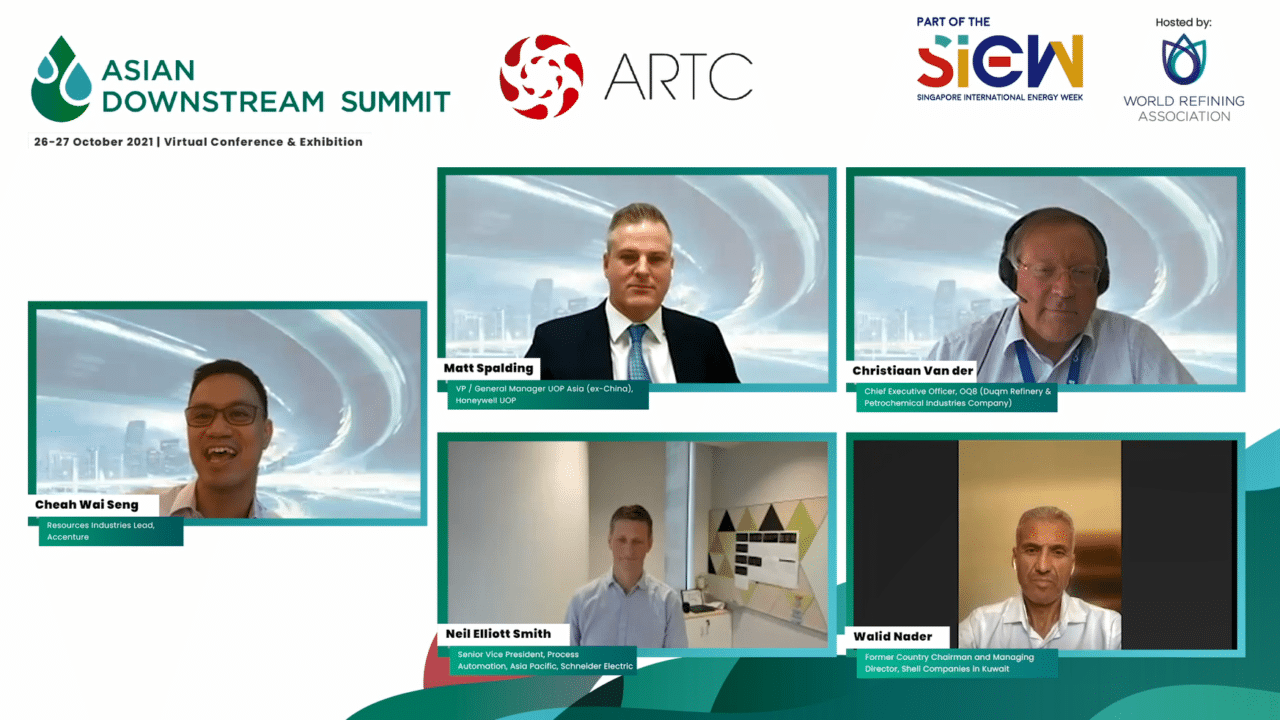CEOs discuss: How has COVID-19 impacted the O&G?
Pertinent topics discussed during the recent virtual Asian Refining Technology Conference included the drive towards sustainability, decarbonisation efforts, regulatory tightening in CO2 emissions, and advancements in electric mobility.
The ARTC brought together C-suite business leaders in an insightful discussion led by Cheah Wai Seng, Resources Industries Lead at Accenture, to take a look back at how the COVID-19 pandemic has affected the sector, and how much further the impact might run.

“There is an acceleration on the energy transition,” shared Walid Nader, Former Country Chairman and Managing Director of Shell Companies in Kuwait, “and if we go to the downstream part of the oil and gas, we see many companies now exploring opportunities to provide hydrogen – clean, blue or green – and we also see some of the refineries looking at how they can reduce their energy consumption.”
Adding on to this sentiment was Neil Elliott Smith, Senior Vice President, Process Automation, Asia Pacific at Schneider Electric, who stated that he “[doesn’t] think downstream is going to go away… It’s not necessarily an existential threat to energy. If anything, we’re seeing increasing demand, certainly across the Southeast Asian and Asian perimeter, and largely driven by demand and population pressures.”
One large part of the energy transition could see refineries turning more toward the process of electrification, which Smith emphasized was less linked to catalysts and more to do with making existing processes more efficient. “An efficient organization is profitable as a sustainable organization,” he said, “so we’re seeing a lot of investments around how you bring digital technologies into the arena.”
As the industry shifts toward increased energy efficiency, refiners must be ready to face the different impacts that this will invariably have on the industry. One such impact, according to Matt Spalding, VP & General Manager at Honeywell UOP, was that customers are starting to set their own net-zero targets and “putting in place the pathways for their operations to get to net-zero”.
“There is this view of how we can move faster into the petrochemicals market” states Spalding. “The question is, how do we potentially integrate our existing assets to maximize our petrochemical production?”
“We’re seeing opportunities and investments, looking at maximizing petrochemical feedstocks or petrochemical products out of the refinery. We’re also seeing customers developing their own sustainable solutions in the form of biofuels, renewable diesels, green jetfuel… It’s really quite a broad impact that the energy transition is having on the downstream industry.”
The discussion shifted to centre around the role of technology in streamlining developments and operational efficiencies for the industry. How can refineries and facilities leverage on digital advancements while ensuring that they properly integrate the “people element” of the industry?
“Operational Excellence is not the panacea, the silver bullet for the energy transition,” cautioned Christiaan Van der Wouden, Chief Executive Officer, OQ8 (Duqm Refinery & Petrochemical Industries Company), and added that approaches toward achieving operational excellence needed to be more tactical and strategic.
“The competition for investments and people will become elements that are a significant part of the energy transition” he claims. “The oil industry in general has built a supply chain towards customers… And I think that our industry with our capability or mega investment, projects, operations, international business, is fairly well placed, just to implement all these new technologies and infrastructure.”
We will be doing different things, but we can build on our strengths – and that is an area where we can take the lead and continue to have a good standing.”
Missed out on this session during ARTC 2021? Register and watch it HERE! **complimentary access for refiners only**